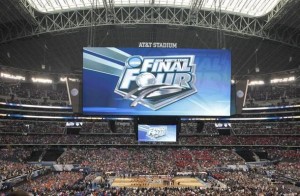
By Jimmy Burch
ARLINGTON — Based on program pedigrees, college basketball historians would not be surprised by a Kentucky-Connecticut matchup in an NCAA title game in a typical season.
But this is 2014, a season far from typical for two programs that have combined to win 11 national championships.
Kentucky (29-10), the No. 8 seed in the Midwest Region, dropped a regular-season game to South Carolina (14-20), which finished 13th in the 14-member SEC. UConn (31-8), the No. 7 seed in the East Region, lost both of its regular-season meetings to SMU, an NIT participant, and also fell to Houston (17-16), which did not play in any postseason tournament.
Yet the two power programs meet at 8:10 Monday night, warts and all, for the right to cut down the nets in AT&T Stadium and be recognized as the NCAA national champion. For the foreseeable future, Kentucky (29-10) and UConn (31-8) will be the answer to a trivia question that might stump lots of college basketball fans:
Which teams were the longest long shots, based on tournament seeds, to meet in an NCAA championship game?
The Wildcats and Huskies, with a combined seed total of 15, have played their way into that distinction. UConn is the first No. 7 seed to play for an NCAA title since the seeding process began with the 1979 tournament. Kentucky can join Villanova, the 1985 champion, as the only No. 8 seeds to win a championship. No team seeded higher than Villanova has won an NCAA title.
How surprising is this title-game matchup of power programs experiencing also-ran seasons before catching fire in March Madness? Consider: Among the 11.01 million brackets in ESPN’s tournament challenge, only .00016 of 1 percent (1,780) had Kentucky facing UConn in the title game.
According to Las Vegas oddsmakers, Kentucky began the tournament with 40-1 odds to cut down the nets at AT&T Stadium, the same venue where the Wildcats fell to Baylor 67-62 in a Dec. 6 contest. UConn was given 100-1 odds.
Yet both schools arrive with a 50-50 shot to collect another national title. Kentucky has won eight. UConn has won three. That is quite a twist from last season, when neither school made the NCAA’s 68-team bracket.
Kentucky coach John Calipari spent Sunday downplaying the significance of the less-than-stellar seeds that have served to motivate players on both teams.
“After your first game, even if you’re highly seeded, every other game’s hard in this tournament,” said Calipari, who stressed that both schools were undervalued by members of the NCAA selection committee. “I don’t think we were an eighth seed. I don’t think Connecticut was a seven seed. But that’s where they seeded us.”
Because of that starting point, Calipari said both schools “had one more hard game than some of the other teams had” in advancing through the tournament bracket. But both teams have thrived while setting a precedent unseen in this tournament in 38 years. Monday’s matchup marks the first time since 1966 that two teams will play for an NCAA title after both failed to make the tournament the previous season.
The opportunity intrigues UConn guard Shabazz Napier, one of three seniors who were part of the program when the Huskies won the 2011 national title.
“We all play the game of basketball to compete against the best. This is one of them games,” Napier said. “We put our jerseys on the same way they do. We all believe.”
Both teams have history on their side. UConn is 3-0 in NCAA championship games, including title-clinching triumphs in Houston (2011) and San Antonio (2004). The Huskies could complete a Texas Trifecta with a victory in Arlington.
Kentucky, 8-3 in NCAA championship games, has a Texas Trio working in its favor. Three of the Wildcats’ five freshmen starters played high school basketball in the Lone Star State (forward Julius Randle, guards Aaron and Andrew Harrison). Randle, a Dallas native, called it “just amazing” to have an opportunity to claim an NCAA title in front of family and friends in his home state.
“To be here and playing on the final day means a lot,” Randle said. “If we are the champions, it will be because we did it together, played hard and trusted each other.”
A Kentucky triumph also would underscore the surprise nature of this title run. An NCAA champion must win six consecutive tournament games. Kentucky’s longest winning streak this season is five. But that streak is active. So, too, is the hunger of UConn’s seniors to bookend their college careers with another NCAA title in Texas.
“We certainly have much more experience on this team,” forward Niels Giffey said, comparing the current Huskies to the 2011 title team. “We have good team chemistry. This whole group has been through so many down periods that I think we really worked hard for this.”
In Monday’s title game, only one thing is certain. A team that has experienced its share of down moments will enjoy college basketball’s ultimate high: cutting the nets as a national champion.